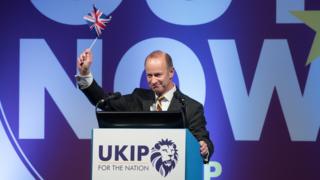UKIP’S AGONY
So now we know! UKIP, I think rather to the surprise of all involved as well as all commentators, has elected the relatively unknown Henry Bolton with just 3,874 votes.
Mr Bolton had been UKIP’s Police Commissioner candidate in Kent, but apart from that his career track record had been in the army and the police and as a Liberal Democrat parliamentary candidate standing against Philip Hammond. He was also an EU apparatchik. His background is therefore somewhat surprising for the new Leader of UKIP!
Henry Bolton is the fourth Leader that UKIP has had in 18 months. Their chaotic leadership turbulence has undoubtedly contributed to their fragmentation from the highpoint of them being the main key to the ‘Leave’ vote in the EU referendum.
The public generally seems to think that UKIP’s job is done, judging by UKIP’s election results, but having 18 months of leadership turbulence cannot have helped. This can also be seen in the turnout levels in three leadership levels.
The turnout in the leadership election when they elected Diane James on 16th September 2016 was 17,842. The turnout on 28th November 2016 that elected Paul Nuttall was 15,370. The turnout that elected Henry Bolton on the 29th September 2017 was 12,915 votes.
Now the 2,755 members who voted for Anne Marie Walters and the 2,021 UKIP voters that voted for John Rees-Evans both look set to leave the Party along with both of their preferred leadership candidates.
This is not at all surprising given the insults which they have been subjected to by both Nigel Farage and Mr Bolton himself. If all their supporters leave it would be an exodus of 4,776 members.
I generally take it as the best possible measure of active membership within a party that every member of the party who still identifies themselves as a member of the Party and is engaged with the Party will vote in a leadership election. This is particularly so if, as in the case of UKIP, it was a postal ballot. There is little effort for the individual member in ticking a box and returning the form in the envelope provided, so almost all who care will do so.
It follows that shortly the engaged members of UKIP will be down to 8,139 which is below the 10,000 critical mass level required for maintaining a fully functional political party.
At that point UKIP’s only advantage over the English Democrats (with our 4,500 members) will be reduced to the difference in membership subscriptions and manpower and also the fact that they still have MEPs and other elected officials who are no doubt full time activists for the Party and contribute something to its running costs. Naturally most of those will go in mid-2019.
We may then be back to where we were before the UKIP surge in support in 2011/2012, when we generally beat them whenever we came across them especially where there was a reasonably level playing field. We also achieved much better results per pound than they were able to do. That was because the English Democrats were then clearly identified as the only political party standing up for England.
UKIP succeeded in initially pulling the wool over many peoples’ eyes and made them believe that they also stood up for English interests between 2012 and 2016. Now however it has become obvious, after their leadership elections in 2016 and 2017, that UKIP’s Leaders have rejected any pretence that they are interested in England, the English Nation or in English national issues.
The academic who has done most to study the rise of UKIP (and before that of the BNP) is Professor Matthew Goodwin of Kent University Canterbury. What his research shows and what he says himself is that there is space on the political spectrums for, in English politics what he would refer to, being himself of the Left, as a Radical Right party, similar to that of Marine Le Pen’s Front National.
It doesn’t appear from the remarks that Mr Bolton has made so far that he wants UKIP to be that party.
Mr Bolton has declared that he is not against immigration and, for that matter, he is not even against a transition period in the process of us leaving the European Union. He is therefore happy to not only wait to exit the European Union, but also to do so on the basis that Mrs May is currently talking about, that is continuing to make very substantial payments into the EU budget.
Mr Bolton also strongly attacked Anne Marie Walters and her followers as being racists and Nazis and of the BNP tendency.
Since Anne Marie Walters, although she is very much against Islam, does so from the militant Left/Liberal perspective of wishing to protect Gay Rights rather than as an advocate of the preservation of English traditions and traditional morality (which is not perhaps surprising given that she is of Irish origin and a Lesbian), it was clear that Mr Bolton’s intent on making those remarks wasn’t actually to describe Anne Marie Walters politics, but rather merely to smear her (given the Nazi regime’s record was of executing large numbers of homosexuals and others whom they called “degenerates”!).
If I am right and Mr Bolton’s leadership will take UKIP firmly back into the safe territory of British Establishment Politics, then I must say I really cannot see any future role or purpose for them at all.

